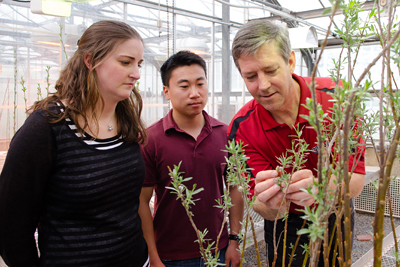Willow grant could speed development of promising bioenergy crop
By Sarah Thompson

The commercialization of shrub willow as a bioenergy crop could be years closer, thanks to a $1.37 million grant that will allow Cornell researchers to take advantage of the newly mapped shrub willow genome to study hybrid vigor and yield.
Larry Smart, associate professor of horticulture, has partnered with Christopher D. Town, professor at the J. Craig Venter Institute (JCVI) in Rockville, Md., to study the genetics of superior growth in hybrids of shrub willow, a fast-growing, perennial cool-climate woody plant.
"Determining the precise genetic mechanisms that produce hybrid vigor has been a scientific challenge for a century," said Smart.
Unlocking those mechanisms and then developing simple techniques for finding the genetic fingerprint for hybrid vigor in parent species could cut the time it takes to identify promising progeny, Smart said. And time is money; for farmers to adopt a new crop like shrub willow -- and for companies to accept the end product -- they need assurance of long-term profitability before taking on the associated higher risk.
"We think the results of this research will take years off the cycle time needed to find the best growing shrub willow hybrids and with consistent increases in yield each cycle, we will rapidly advance commercialization of this emerging bioenergy crop," Smart said.
Specifically, the researchers will examine gene expression patterns in shrub willow species hybrids.
The grant is part of a $41 million investment by the U.S. Department of Energy (DOE) and the U.S. Department of Agriculture in research to improve efficiency and innovation in biofuel production and feedstocks. It is the first project to take advantage of the recently mapped shrub willow genome, the product of a three-year DOE-funded endeavor by Smart's lab, JCVI and several DOE national labs.
The New York State Department of Agriculture and Markets estimates there are more than 1 million acres of poorly drained and otherwise underutilized land in New York alone. Using this land to grow shrub willow could create a new regional cash crop. And unlike corn or sugarcane, shrub willow does not need the more fertile soil used for the production of fruit, vegetables or livestock feed. It also needs less fertilizer and other inputs to thrive.
"Willow represents an important bioenergy crop for the northeastern part of the U.S., and the hybrids that are being developed by Cornell have the potential to provide higher yields of more suitable biomass and with more efficient use of resources such as water," Town said.
Improving shrub willow yields on marginal land is the main goal for Smart's willow breeding program, which began in 1998. Smart also participates in projects to demonstrate its use and value to farmers, biofuels companies, small businesses and municipalities. This includes the installation of a new boiler to heat two buildings at the New York State Agricultural Experiment Station with willow biofuel produced on the Geneva campus.
"We're at a key juncture in New York, where we're deciding whether or not to extract more fossil fuels locally. At the same time, we need to explore renewable energy options that will stimulate the local economy and not contribute to global climate change," Smart said.
Smart hopes the grant will attract other researchers to study willow and ensure the long-term success of willow breeding.
"In addition to its practical value, the project can shed light on the mechanisms underlying the phenomenon of hybrid vigor, which is of broad agronomic interest," said Town.
Sarah Thompson is a freelance writer based in Trumansburg, N.Y.
Media Contact
Get Cornell news delivered right to your inbox.
Subscribe